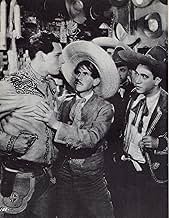Añade un argumento en tu idiomaA "comedia ranchera", where two good friends fall in love with the same girl.A "comedia ranchera", where two good friends fall in love with the same girl.A "comedia ranchera", where two good friends fall in love with the same girl.
- Premios
- 1 premio y 1 nominación en total
Carlos López
- Florentino
- (as Carlos López 'Chaflán')
Manuel Noriega
- Don Rosendo
- (as Manolo Noriega)
Lucha María Ávila
- Cruz niña
- (as Lucha Avila)
Trío Tariácuri
- Trío
- (as Trío Tariácuris)
Argumento
¿Sabías que...?
- CuriosidadesThis film's initial USA telecast took place Friday 15 November 1939 on New York City's pioneer experimental television station W2XBS, which would not be granted full time commercial status until 29 June 1941 as WNBT (Channel 1).
- ConexionesReferenced in De noche vienes, Esmeralda (1997)
Reseña destacada
Known in Spanish as "Allá en el Rancho Grande," this is an iconic Mexican film that launched the genre of Ranchera movies, which were wildly popular through the 1940's. These movies idealized rural life, and presented melodramatic tales about young lovers. Typically, the male protagonists are charros (fancy dress Mexican cowboys) who sing songs and fight hard, in the name of their masculine honor.
IMDb classifies this movie as a comedy, which it is not. The confusion probably springs from the fact that Allá en el Rancho Grande is usually classified by Mexican and U.S. Academics as a 'Comedia Ranchera.' Technically, the humor here is secondary to the songs and the melodrama, so perhaps it would be more accurate to refer to this movie as a melodrama in the Ranchero genre. Debates aside, don't expect the movie to be a comedy, although it has humor in it.
This original version, directed by Fernando Fuentes, who was arguably the greatest Mexican director of the 1930's (El Compadre Mendoza, El Prisionero 13, and Vámonos con Pancho Villa are masterpieces), is MUCH better than the 1949 remake starring Jorge Negrete. I say this with all due respect to the iconic stature of Negrete, a beloved Mexican star. The actors in this movie are younger, fresher, and more realistic. There's something shopworn about the later version-- everyone seems older than they should be, and less likable.
I love the embroidered Charro shirts worn by the actors in this movie.
IMDb classifies this movie as a comedy, which it is not. The confusion probably springs from the fact that Allá en el Rancho Grande is usually classified by Mexican and U.S. Academics as a 'Comedia Ranchera.' Technically, the humor here is secondary to the songs and the melodrama, so perhaps it would be more accurate to refer to this movie as a melodrama in the Ranchero genre. Debates aside, don't expect the movie to be a comedy, although it has humor in it.
This original version, directed by Fernando Fuentes, who was arguably the greatest Mexican director of the 1930's (El Compadre Mendoza, El Prisionero 13, and Vámonos con Pancho Villa are masterpieces), is MUCH better than the 1949 remake starring Jorge Negrete. I say this with all due respect to the iconic stature of Negrete, a beloved Mexican star. The actors in this movie are younger, fresher, and more realistic. There's something shopworn about the later version-- everyone seems older than they should be, and less likable.
I love the embroidered Charro shirts worn by the actors in this movie.
- chrisconway-16046
- 23 jun 2015
- Enlace permanente
Selecciones populares
Inicia sesión para calificar y añadir a tu lista para recibir recomendaciones personalizadas
Detalles
- Fecha de lanzamiento
- País de origen
- Idioma
- Títulos en diferentes países
- Out on the Big Ranch
- Localizaciones del rodaje
- Empresas productoras
- Ver más compañías en los créditos en IMDbPro
- Duración1 hora 35 minutos
- Color
- Mezcla de sonido
- Relación de aspecto
- 1.37 : 1
Contribuir a esta página
Sugerir un cambio o añadir el contenido que falta

Principal laguna de datos
By what name was Allá en el Rancho Grande (1936) officially released in Canada in English?
Responde























